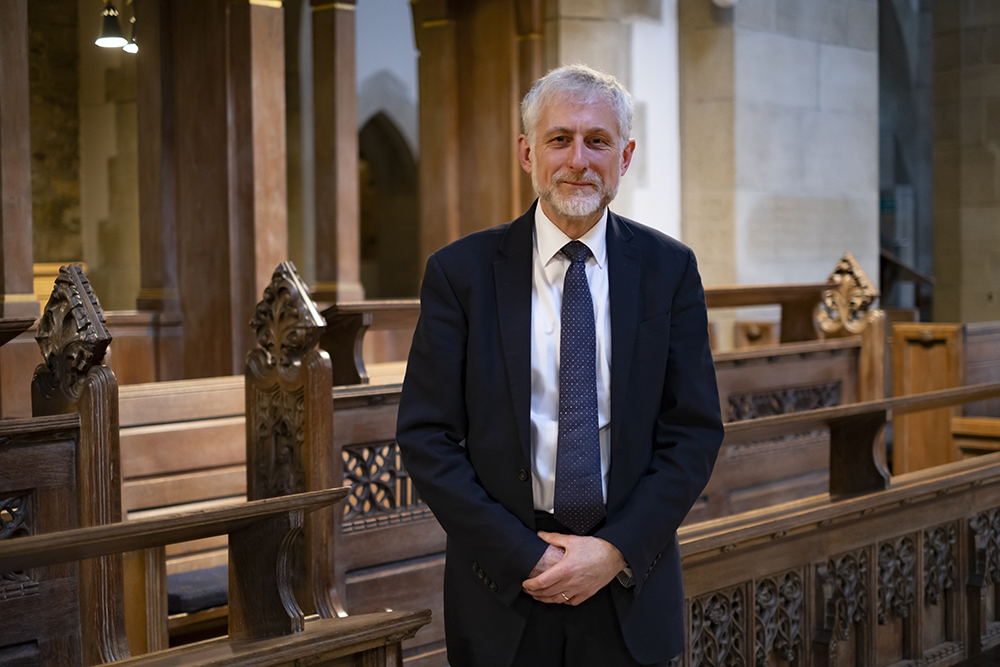On Wednesday 27th March we welcome Keith Wright from York for our final organ recital of the 2024 spring season. In this edition of ‘Notes from an Organist’ we discover more about them, and what to expect from their recital, including being the organist at Bobby Robson’s funeral; preparing for a tour of New York; and singing carols in 35-degree heat!
Could you introduce yourself, how you got into music / become an organist and your musical journey to where you are today?
I first became interested in music because my grandfather was a string player: he began as a violinist, and then took up the cello, and played in the band for shows and light opera performances. We had a piano at home, so it seemed quite natural to want to play music. The interest in the organ began when I joined the local church choir, and continued when I became a cathedral chorister at Wakefield. Organ lessons as a teenager led to an organ scholarship at Edinburgh University, when the eye-opening discovery was the world of early music, and the issues around period instruments. The University’s fantastic collection of old keyboard instruments was made available to us, and ignited what has been a life-long interest.
What can people expect from your recital at Bradford Cathedral?
My recital focuses on the music of J S Bach, and shows different facets of his output, with large-scale pieces framing contrasting works which show a more intimate and contemplative mood.
Why do you enjoy playing the organ?
Most organists would agree that it is often to do with making an impressive sound in a large space! It can also be about trying to communicate musical ideas via quite an unpromising medium: here is a wind instrument, made to operate by means of complex mechanisms controlled by the fingers and feet. The challenge is to make it all sing, or shout, or whisper.
Do you have a particular favourite piece out of those you are playing?
The final piece, Aus tiefer Not, is an old favourite of mine: it’s Bach’s only genuine 6-part piece of organ music, and works by weaving five imitative voices around the chorale theme, which is played by the right foot!
This season’s theme is ‘Trios and Trio Sonatas’ which features JS Bach’s six trio sonatas in full. Are you playing one and, if so, which one is it, why did you choose this one, and why are you looking forward to playing it?
I am playing the fifth trio sonata, in C. It’s one I learned as a student, in order to enter a competition, and although the memory of that still brings me out in a cold sweat, the joy of the music shines through: the two outer movements are lively and jolly, and the central slow movement has echoes of the best of Bach’s writing for solo instruments. Playing trios on the organ is always a balance between making it sound like intimate chamber music, and playing out into the space. My approach to the music has changed many times over the years, and has probably not yet reached a fixed form!
What are your hopes or plans musically for 2024?
This year brings what has become the usual mix of musical activities both large and small. In my school job, we are preparing for a tour to New York this summer, including a Sunday Eucharist at St Thomas, Fifth Avenue, where I’m looking forward to playing the magnificent new organ, dedicated to the memory of my teacher, John Scott. In my church role, I enjoy developing the work and repertoire of the choir: very much a parish choir, with a mix of ages and experience, the singers achieve a remarkable standard every week, and always manage to lift the spirits, whatever the challenges of the week have been.
Your recital falls in Holy Week; will you be reflecting that in your music choices?
The first thing that struck me about the date of my recital was that Holy Week gave an opportunity to offer perhaps some more reflective repertoire. I always feel that – whatever the question – Bach has probably written an answer to it. Knowing that trios were a theme of this year’s recitals, I thought I would also show Bach at work in five and six parts: the Vater unser setting is a masterpiece, with the hands beginning in trio sonata style, before the melody appears, in canon, to make a complex five-part texture. It is all done with such ease, and yet such breathtaking beauty!
You work at schools in York as a Director / Assistant Director of Music. How important is the teaching of music in an educational environment?
The weekday job is teaching at St Peter’s School. It’s unusual for a day to go by without the classroom discussion digressing to discuss politics, history, other art forms, science or maths. Music can encompass it all, and is central to the life of the school. Outside the classroom, although many pupils will go on to be advanced musicians, there are many more who simply do it for enjoyment, and they learn so many useful skills, not least self-confidence and teamwork.
You have worked as part of various music groups – have there been any standout moments, roles you’ve done, or places you’ve been?
Working in cathedrals for over 25 years, there have been many large-scale occasions which stand out, usually involving playing quite loudly! Being the organist for Bobby Robson’s memorial service was an interesting experience: it remains the only live Sky TV broadcast I have ever been part of. With the Durham choir, visiting Brazil for a pre-Christmas tour was interesting: we went straight from scorching afternoons on the beach to carol services and concerts with all the usual decorations (fake snow on the windows, Santa hats, reindeer, sleighs). And yes, we did sing Darke’s In the bleak mid-winter, in 35-degree heat. My musical highlights always seem to return to Bach, and away from my cathedral work a particularly satisfying spell was the handful of years in which I conducted all the major choral works (including the two Passions and the B-minor Mass) with period instruments.
Finally, how would you sum up your upcoming recital at Bradford Cathedral?
I always enjoy returning to Bradford: I have been visiting periodically to do musical things for over 40 years, and some of the earlies memories I have are to do with performances at the cathedral, including the first time I heard any music by Petr Eben, and the first time I sang the Duruflé Requiem, as a young treble.
You can join us on Wednesday 27th March at 1pm to hear Keith’s organ recital, with an optional £4 buffet lunch beforehand at 12:30pm. You can find out more about the work of St. Olave’s Church on their website.
You can discover more about our organ recital season on our dedicated page.

